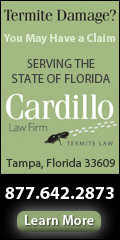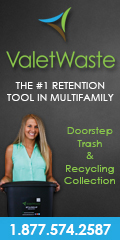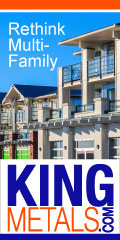
| Past Issues | Advertise | www.faahq.org | Multifamily FLORIDA archive | September 2014 |
Increasing Asset Protection: Have You Made an Adjustment Yet?
As the multifamily housing industry continues to enjoy strengthening markets, owners and operators keep a close eye on the metrics that impact their business decisions and bottom line. In most of the U.S., occupancy and effective rents have been trending upward while concessions have decreased. It would be logical to expect security deposits to have increased as well, but many apartment operators have not done so for fear of losing occupancy.
The industry standard of aligning a given propertyís security deposits with what direct competitors are charging is very much entrenched. That ingrained habit runs contrary to major strides in the adoption of new operational tools in such areas as lead generation, applicant screening, and revenue management, all of which help optimize performance and allow a manager to have more autonomy rather than tying their policies to someone elseís. Isnít now the time to reevaluate security deposits to ensure properties are being properly positioned, from both a marketing and risk management perspective?
The concept of requiring a resident to hand over a security deposit that may be used against damages or lost rent is a common risk mitigation strategy in our industry. However, whether it was competitive pressures that kept deposits at less than desirable levels or the impact of the economic downturn leaving soft markets in its wake, a lot of properties across the country became complacent with their exposure to resident loss. No one can say just how long the multifamily housing industry will be able to ride this favorable wave of the market cycle so now is the time to realign security deposit policies with operating goals.
In order to secure a satisfactory level of asset protection without conceding an advantage to competitors, many operators are utilizing a security deposit alternative program. These products are offered alongside a traditional refundable deposit at a fraction of the cost while offering increased coverage in the event of damage or unpaid rent. Prospective renters are given the choice between a higher refundable deposit and a lower cost, non-refundable move-in option. Because their prospects can choose between the two, security deposit alternatives act as a sensible stepping stone for property managers who seek to have more cash on hand, double their unit coverage, and better position their sites.
Security deposit alternative programs offer significant marketing and leasing advantages as well as asset protection for owners and operators; additionally, they allow residents to keep more of their money in their pocket. Americans are more cost-conscious than ever regardless of their income level. The implementation of a security deposit alternative program can prove to be a very sound business decision across all asset types and classes.
Larry Feld is the Eastern Vice President for DepositIQ. Available nationwide, their innovative security deposit alternative product is successful with all types of properties including market rate, student, affordable, senior, and manufactured housing. Visit www.depositiq.com for more information or contact Larry at 1-877-684-4039, ext. 806. |



